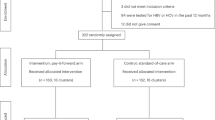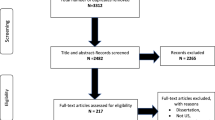Abstract
Rapid HIV testing programs in emergency departments (EDs) have been shown to promote early diagnosis and linkage to specialty care. However, sensitivity of the subject-matter and stigmatization of disclosing associated risk factors may make patients reluctant to consent to testing in this setting. This study sought to determine whether men are more likely to refuse rapid HIV testing in the ED as compared to women and to analyze the influence of tester gender on the response. This retroactive study utilized demographic and testing information from a rapid HIV testing program housed within two urban EDs for a 5-month period. Gender and age were collected for both testers and patients, along with patient consent outcome. A total of 5358 patients (males = 2230; females = 3128) were approached and offered an HIV test by one of 19 testers during the study period. From the sample population, male and female patient refusal rates were similar (30.0% vs 29.1%, respectively). Female testers approached 57.8% (n = 3,095) of the patients; however, they had a significantly higher refusal rate compared to male testers (35.6% vs 21.4%; p < 0.001). We found a potential gender effect on HIV test consenting. Such a finding could have important implications on HIV screening program effectiveness and warrants further investigation.

Similar content being viewed by others
References
HIV/AIDS, Centers for Disease Control and Prevention. (2017). HIV/AIDS: Basic Statistics. Retrieved from https://www.cdc.gov/hiv/basics/statistics.html. December 06, 2017.
Marks, G., Crepaz, N., & Janssen, R. (2006). Estimating sexual transmission of HIV from persons aware and unaware that they are infected with the virus in the USA. AIDS.,20(10), 1447–1450.
Centers for Disease Control and Prevention. (2006). Revised recommendations for HIV testing of adults, adolescents, and pregnant women in Health-Care Settings. Atlanta: Centers for Disease Control and Prevention. MMWR Surveillance Summaries.
Centers for Disease Control and Prevention. (2006). Missed opportunities for earlier diagnosis if HIV infection—South Carolina, 1997–2005. Atlanta, Centers for Disease Control and Prevention: MMWR Surveillance Summaries.
Centers for Disease Control and Prevention. (2007). Rapid HIV testing in emergency departments—three U.S. sites, January 2005–March 2006. Centers for Disease Control and Prevention. MMWR Surveillance Summaries.
Haukoos, JS, Hopkins, and E, Byyny, RL. (2008). Patient acceptance of rapid HIV testing practices in an urban emergency department: Assessment of the 2006 CDC recommendations for HIV screening in health care settings. Annals of Emergency Medicine, 51(3):303–309, 309 e1
Drainoni, M.-L., Koppelman, E., Mitchell, P., et al. (2017). Why do patients refuse HIV testing in the emergency department? Perspectives from a qualitative study. Journal of HIV/AIDS & Social Services.,16(3), 207–221.
Czarnogorski, M., Brown, J., Lee, V., et al. (2011). The prevalence of undiagnosed HIV infection in those who decline HIV screening in an urban emergency department. AIDS Red Treatment,2011, 879065.
Christopoulos, K. A., Weiser, S. D., Koester, K. A., et al. (2012). Understanding patient acceptance and refusal of HIV testing in the emergency department. BMC Public Health.,12, 3.
Pisculli, M. L., Reichmann, W. M., Losina, E., Donnell-Fink, L. A., et al. (2010). Factors associated with refusal of rapid HIV testing in an emergency department. AIDS and Behavior, 15(4), 734–742.
Acknowledgements
Michigan Department of Health and Human Services. Wayne State University School of Medicine.
Author information
Authors and Affiliations
Corresponding author
Ethics declarations
Conflict of interest
All authors declare that they have no conflict of interest.
Additional information
Publisher's Note
Springer Nature remains neutral with regard to jurisdictional claims in published maps and institutional affiliations.
Rights and permissions
About this article
Cite this article
Mutebi, C.M., Foster, B., Foley, D. et al. Acceptance of Rapid Human Immunodeficiency Virus Testing in an Urban Emergency Department. J Community Health 45, 728–731 (2020). https://doi.org/10.1007/s10900-019-00787-7
Published:
Issue Date:
DOI: https://doi.org/10.1007/s10900-019-00787-7




